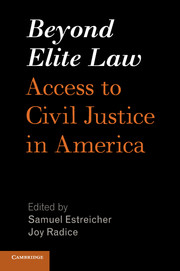Book contents
- Frontmatter
- Contents
- Beyond Elite Law
- Foreword
- List of Contributors
- Overview
- Overview
- PART I CURRENT STATE OF ACCESS TO LEGAL SERVICES
- PART II SOURCES OF LEGAL SERVICES ASSISTANCE FOR WORKING AMERICANS
- PART III FASHIONING A REFORM AGENDA
- 23 New York State Task Force to Expand Access to Civil Legal Services
- 24 New York's 50-hour Pro Bono Requirement
- 25 Starting a “Low Bono” Law Practice
- 26 Toward a More Effective and Accessible Solo and Small Firm Practice Model
- 27 Facilitating Homemade Wills
- 28 Court Facilitation of Self-Representation
- 29 Limited Representation and Ethical Challenges
- 30 Technology Can Solve Much of America's Access to Justice Problem, If We Let It
- 31 Mediation of Employment Disputes at the EEOC
- 32 AAA Consumer Arbitration
- 33 Saturns for Rickshaws: Lessons for Consumer Arbitration and Access to Justice
- 34 Employment Arbitration in the Securities Industry
- 35 FINRA Arbitration and Employment Disputes
- 36 Arbitration as an Employee-Friendly Forum
- 37 Access to Justice in Employment Arbitration: a Critical Look
- 38 Collaborative Technology Improves Access to Justice
- 39 Union Representation in Employment Arbitration
- 40 Legal Representation for New York City's Chinese Immigrant Workers
- 41 Reassessing Unauthorized Practice of Law Rules
- 42 The Pyett Protocol: Collectively-Bargained Grievance Arbitration as a Forum for Individual Statutory Employment Claims
- PART IV CREATING A CULTURE OF SERVICE
- Index
37 - Access to Justice in Employment Arbitration: a Critical Look
from PART III - FASHIONING A REFORM AGENDA
Published online by Cambridge University Press: 05 May 2016
- Frontmatter
- Contents
- Beyond Elite Law
- Foreword
- List of Contributors
- Overview
- Overview
- PART I CURRENT STATE OF ACCESS TO LEGAL SERVICES
- PART II SOURCES OF LEGAL SERVICES ASSISTANCE FOR WORKING AMERICANS
- PART III FASHIONING A REFORM AGENDA
- 23 New York State Task Force to Expand Access to Civil Legal Services
- 24 New York's 50-hour Pro Bono Requirement
- 25 Starting a “Low Bono” Law Practice
- 26 Toward a More Effective and Accessible Solo and Small Firm Practice Model
- 27 Facilitating Homemade Wills
- 28 Court Facilitation of Self-Representation
- 29 Limited Representation and Ethical Challenges
- 30 Technology Can Solve Much of America's Access to Justice Problem, If We Let It
- 31 Mediation of Employment Disputes at the EEOC
- 32 AAA Consumer Arbitration
- 33 Saturns for Rickshaws: Lessons for Consumer Arbitration and Access to Justice
- 34 Employment Arbitration in the Securities Industry
- 35 FINRA Arbitration and Employment Disputes
- 36 Arbitration as an Employee-Friendly Forum
- 37 Access to Justice in Employment Arbitration: a Critical Look
- 38 Collaborative Technology Improves Access to Justice
- 39 Union Representation in Employment Arbitration
- 40 Legal Representation for New York City's Chinese Immigrant Workers
- 41 Reassessing Unauthorized Practice of Law Rules
- 42 The Pyett Protocol: Collectively-Bargained Grievance Arbitration as a Forum for Individual Statutory Employment Claims
- PART IV CREATING A CULTURE OF SERVICE
- Index
Summary
As one of the editors of this book has argued, arbitration of employment disputes through company-promulgated programs can provide a mode of dispute resolution accessible to, and resulting in a hearing for, employees with incomes and claims that generally do not attract private lawyers. However, reviewing data from the files of a leading arbitration provider, Colvin and Pike suggest in this chapter, though without controlling for possible systematic differences between employees obtaining a hearing in arbitration and employees whose claims survive to trial in court, that employment arbitration results in lower average recoveries than obtainable in private litigation and that arbitrators are showing greater receptivity to entertaining dispositive motions.
Alternative dispute resolution (ADR) procedures, including arbitration, mediation, and other related techniques, are often held out as providing improved conflict resolution compared to litigation along such outcome dimensions as efficiency, equity, and participant voice. From an access to justice perspective, the potential advantage of ADR procedures is that they may reduce the cost and time barriers to access that are created by the inefficiencies of the litigation system. Although ADR procedures do not typically provide the elaborate fact determination and review process of litigation, the argument for them is that they provide both enough equity to disputants and greater opportunity to have disputes voiced that overall access to justice is enhanced.
In the employment area, the most prominent ADR innovation in recent years is the use of arbitration to resolve statutory and other employment law claims. Whereas labor arbitration has long been a central dispute resolution mechanism in unionized workplaces, until the 1990s arbitration was rarely used in the nonunion sector. This changed in the wake of a key 1991 Supreme Court decision, Gilmer v. Interstate/Johnson Lane, which held for the first time that a statutory employment claim could be subject to arbitration. Over the course of the 1990s and 2000s a series of court decisions reinforced the basic principle that employment law claims could be subject to arbitration and the courts would enforce these arbitration agreements in most circumstances. A controversial feature of employment arbitration is that many procedures are promulgated by employers as a mandatory term and condition of employment, similar to other non-negotiable human resource policies that employers require employees to follow.
- Type
- Chapter
- Information
- Beyond Elite LawAccess to Civil Justice in America, pp. 529 - 543Publisher: Cambridge University PressPrint publication year: 2016



